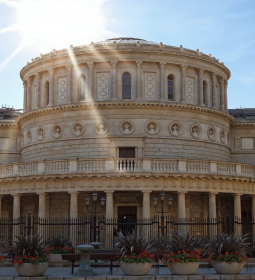Best universities focused on studying philosophy in Canada according to QS World University Rankings offer quality undergraduate and graduate programs for international students.
Philosophy is a fundamental discipline that explores the place of man in the world, the nature of reality, the meaning of human existence, the limits of knowledge. Students will explore how ancient Greek philosophy shaped our current ideas, study the legacy of the geniuses of philosophical thought from Plato to Nietzsche, understand the ethical issues of cyberspace and artificial intelligence.

Developing their own philosophical position, students form the ability to reason logically, to question generally accepted assumptions.
Career opportunities:
- Scientist
- Politician
- Public Administrator
- Lawyer
- Head of HR Department
- Human Rights Officer
- Public Relations Specialist
- Ethics consultant.
Popular courses:
- Critical Thinking
- Philosophy of Law
- Moral issues
- Philosophy of Emotions
- Cyberethics
- Biomedical Ethics.

Best philosophy universities in Canada 2026 - QS World University rankings
| 1 | University of Toronto |
| 2 | McGill University |
| 3 | Western University |
| 4 | York University |
| 5 | University of Calgary |
| 6 | Simon Fraser University |
| 7 | University of British Columbia |
1. University of Toronto
The University of Toronto is a non-profit public institution of higher education located within the city of Toronto. It is a large Canadian university with a mixed form of studying, officially recognized and accredited by the Ministry of Education, Colleges and Universities of Ontario. More than 49,000 students study here. For enrollment, a selective admission policy was developed, based on previous academic achievements and grades of applicants. Foreign applicants can also apply for admission.
The University of Toronto offers students a number of educational and non-academic facilities and services, including a library, residences, sports facilities, study abroad and exchange programs, and administrative support.
The philosophy degree program allows you to obtain a Master of Arts (MA) degree in this field. The course is conducted at the Faculty of Arts and Sciences, where specialists work in various fields, such as the history of philosophy, ethics, philosophy of science and philosophy of consciousness. Students can choose full-time or part-time forms of studying. Admission requires a bachelor's degree (preferably in a related discipline) and high grades.
2. McGill University
McGill University is a non—profit public institution of higher education located within the city of Montreal, Quebec. MGU is officially recognized by the Ministry of Education and Higher Education of Quebec, considered one of the largest Canadian universities with mixed form of studying.The number of students account for approximately 33,000 people: 68% are enrolled in bachelor's degree programs, the remaining 32% in master's degree programs. The share of foreign students makes up 31%, who are representatives of 150 countries of the world at McGill University.
The Undergraduate Philosophy program at MGU is aimed at developing students' clear expression of thoughts and persuasiveness of arguments. Although philosophy itself is not considered a professional qualification, studying it can be an excellent preparation for further careers in such areas as law, business and others. The program includes courses on various topics and historical periods, the possibility of cooperation with other faculties: psychology, linguistics, history, political science, mathematics and physics. The duration of the program is four years.
3. Western University
Western University was founded in 1878, and today 43,000 students, including about 5,000 foreigners from 128 countries, obtain higher education on its campus. According to the QS World University Rankings 2024, Western University positions 114th, making it one of the top 200 leading universities in Canada and in the world.
Students are offered a wide range of courses: more than 400 bachelor's degree combinations and 160 master's degree programs. Western University provides a variety of accommodation options for its students: residences on campus, off-campus housing or living in a host family within the city.
The current university admission rate accounts for 58%. The average score of applicants is 3.4, and the average admission rate of freshmen is approaching 90%, which is one of the highest rates in the country.
To support students, there are various assistance programs: scholarships and grants, which are designed for both local and international students.
The University's Faculty of Arts and Humanities offers a Bachelor's degree program with honors in philosophy. The duration of this course is four years, the studying format is full-time. Admission requirements may vary depending on the student's citizenship and past achievements.
4. York University
York University is located in Toronto, Ontario, considered one of the most important research universities in Canada. This status is confirmed by the fact that it regularly ranks in the top 10 best universities in Canada, in the top 200 best educational institutions in the world.
The competition for admission to YU is 47%. To partly compensate for payment of a student's education, the university provides a variety of scholarships. At YU, you can choose from 200 bachelor's or master's degree programs, which are offered at 11 faculties and schools. Today, YU is recognized as the leading institution in terms of the number of published research materials in the province of Ontario: This status has been confirmed by Corporate Knights, Forbes & CNN Expansion publications. YU positions 6th in the Maclean's Comprehensive ranking and 17th in the QS National ranking. Also the university occupies 494th in the QS global ranking.
There are several student accommodation options on campus: single and double rooms, townhouses and apartments.
Students of the Faculty of Philosophy have the opportunity to study science taking into account the cultural context, covering concepts from different fields, including Western, African and Islamic philosophy. The courses stipulate studying of both classical subjects (history of philosophy, logic, philosophy of law) and modern disciplines (applied ethics, philosophy of consciousness, social and political philosophy, theory of argumentation, feminism). The program offers a choice between bachelor's degree courses in philosophy and cognitive science, and a master's degree program in philosophy. According to the QS World University Rankings, this program is in the top 10 in Canada and in the top 150 in the world.
5. University of Calgary
The University of Calgary is a public research institution located in Calgary, Alberta. It is one of the leading universities in Canada, and one of the 200 best universities in the world.
More than 28,000 undergraduate and graduate students study here, and the admission competition makes up about 55%. To enter the university, applicants must meet certain requirements, including a minimum GPA, proficiency in English and confirmation of financial support.
Students are provided with a choice of accommodation options, including on-campus residences, off-campus housing, and living in a host family.
The University of Calgary has more than 15 faculties and more than 85 departments offering a wide range of educational programs and courses. The philosophy course stipulates the study of basic questions about humanity, the world and man's place in it, including the development of skills in abstract thinking, concept analysis, written and oral communication and logic. Students learn to think critically, analyze complex ideas and form their point of view on various topics. They study the history of philosophy, modern philosophical trends and apply their knowledge for analyzing current problems in various fields: ethics, epistemology, metaphysics and political philosophy.
6. Simon Fraser University
SFU is a non—profit public higher education institution located in Burnaby. Founded in 1965, the university is named after the famous traveler Simon Fraser, having branches in Vancouver and Surrey. Recognized by the British Columbia Ministry of Post-Secondary Education and Future Skills, this major Canadian university offers mixed forms of studying. The selective admission policy is based on entrance exams results and previous academic achievements of students, the admission rate is 80-89%, making it one of the least selective Canadian institutions of higher education.
SFU is considered the most international university in Canada, as about 30,000 foreign students from 140 countries study here.
The SFU building is built in the brutalist style. The peculiarity of the architectural style is the use of untreated concrete, which is why many people call SFU a "human": the building consists of several blocks of different heights connected by passages.
At SFU, the Bachelor's degree program in Philosophy is aimed at exploring the fundamental assumptions and methods of various disciplines, developing creative thinking and philosophical question-answering skills among students. The studying lasts four years. For entering, it requires a high school diploma or its equivalent, knowledge of English (TOEFL 88, IELTS 6.5, Duolingo 125) and compliance with the general university requirements.
7. University of British Columbia
It is one of the leading public research universities in the world, which is regularly ranked in the top 40 of the planet. Two UBC campuses are located in Vancouver and the Okanagan Valley.
UBC has gained popularity thanks to its high academic standards: the admission rate is only 43%. Various accommodation options are available for students on and off campus, including residences, apartments, and separate options for families with children. UBC is home to a large international community with over 10,000 foreign students from 140 countries.
The UBC campus is considered one of the most beautiful in Canada, included in the top ten institutions of higher education in Canada and in the top hundred universities in the world. In the Research Infosource ranking of higher education institutions for 2023, UBC positioned second among Canadian research universities.
Studying approach at UBC gives students the opportunity to acquire in-depth knowledge and develop critical thinking, communication and problem solving skills. The University offers various programs and specializations, including history and philosophy of science, political science and management.







